Smart Investments: Understanding Used Commercial Fridges
Looking for a used commercial fridge? Here's what you need to know:
- Cost savings: 30-60% less than new models
- Types available: Reach-in, undercounter, prep tables, display cases, walk-ins
- Price range: $275 for small units to $4,000+ for large three-door models
- Inspection checklist: Check door seals, temperature consistency, compressor noise, evaporator coils
- Warranty options: Most reputable sellers offer 30-day to 1-year guarantees
A used commercial fridge represents one of the smartest investments a business can make when outfitting a commercial kitchen, mortuary, or any facility requiring reliable refrigeration. These pre-owned units deliver professional-grade cooling performance at a fraction of the cost of new equipment, making them particularly attractive for budget-conscious operations or startups looking to minimize initial capital expenditure.
When properly inspected and maintained, used refrigeration equipment can provide years of dependable service while helping businesses reduce their environmental footprint. The market offers an impressive variety of options - from compact undercounter units to spacious walk-in coolers - allowing buyers to find the perfect match for their specific space and operational requirements.
The key to a successful purchase lies in understanding what to look for, knowing which questions to ask, and identifying reputable sellers who thoroughly test and refurbish their inventory. With the right approach, you can secure commercial-grade refrigeration that meets both your performance needs and financial constraints.
I'm Mortuary Cooler, bringing over 30 years of experience in commercial refrigeration with special expertise in used commercial fridge selection, inspection, and maintenance for mortuary and food service applications. My background includes evaluating thousands of pre-owned units and helping businesses find reliable refrigeration solutions that maximize value while minimizing risk.
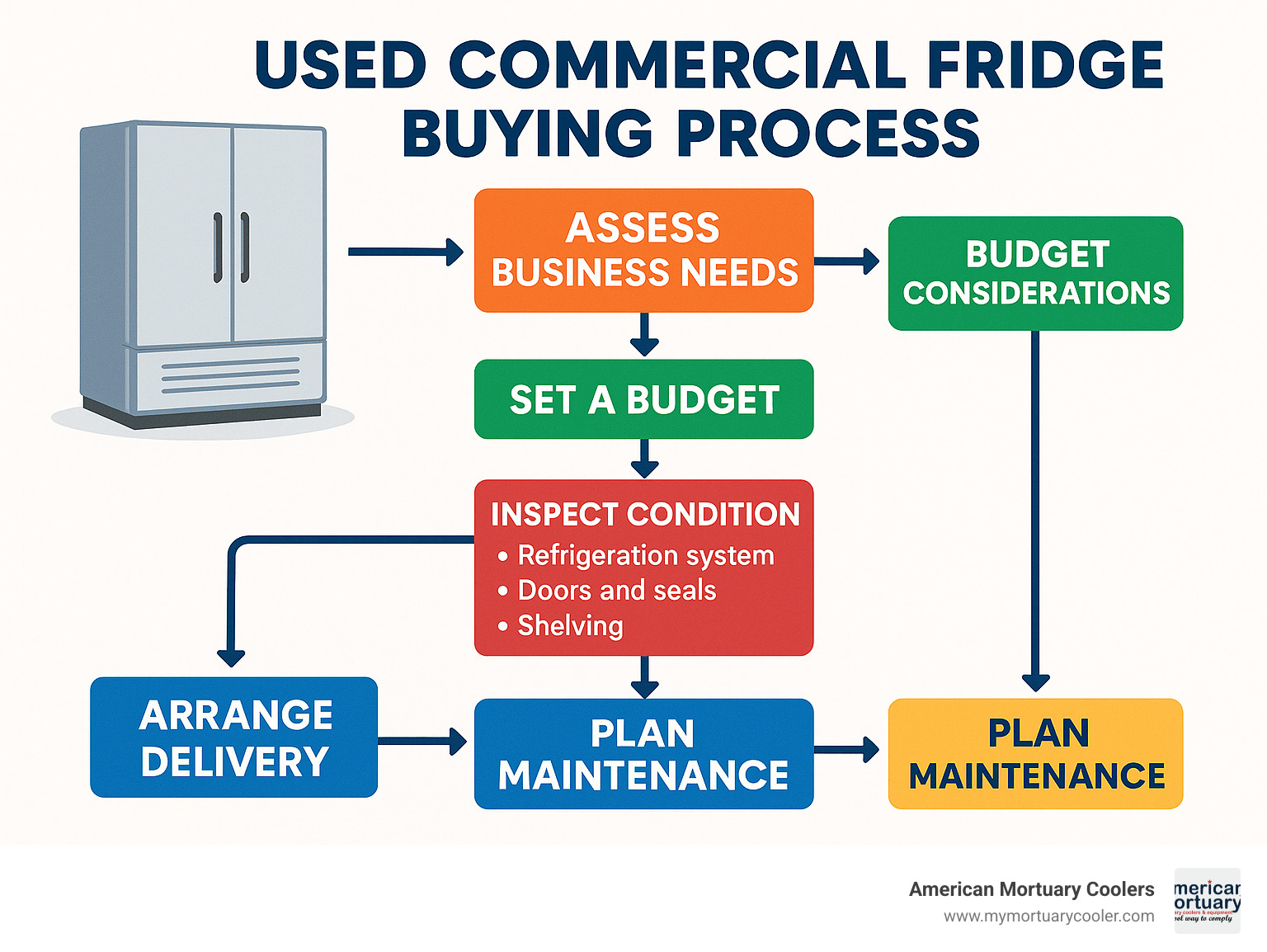
Used commercial fridge terms made easy:
The Big Savings: Benefits of Buying a Used Commercial Fridge
Let's talk money – because that's where the magic happens with a used commercial fridge. When you're running a business, every dollar counts, and pre-owned refrigeration can save you a small fortune. Most of our customers are pleasantly surprised to find they can slash 30-60% off their equipment costs without sacrificing quality or reliability.
I remember when Marcus Thompson called us about his new catering business in Atlanta. He was almost ready to give up on getting professional refrigeration until we showed him a refurbished three-door True reach-in. "We never thought we could afford professional-grade refrigeration when we started," Marcus told me later. "That used unit saved us nearly $3,000 compared to new, and it's been running perfectly for over three years now."
Here's what the numbers typically look like:
| Refrigeration Type | New Model Average Cost | Used Model Average Cost | Typical Savings |
|---|---|---|---|
| Single-door Reach-in | $2,500 - $3,500 | $900 - $1,500 | $1,600 - $2,000 |
| Two-door Reach-in | $3,800 - $5,000 | $1,500 - $2,300 | $2,300 - $2,700 |
| Undercounter | $1,800 - $2,500 | $650 - $1,200 | $1,150 - $1,300 |
| Prep Table (48") | $3,000 - $4,200 | $1,200 - $2,200 | $1,800 - $2,000 |
| Walk-in (6'x6') | $7,000 - $10,000 | $3,500 - $5,500 | $3,500 - $4,500 |
The financial benefits go beyond the initial purchase too. New refrigeration equipment typically loses 20-30% of its value during the first year alone – that's like driving a new car off the lot. Quality used commercial fridges, on the other hand, have already weathered that steep depreciation curve, so they tend to hold their value much better.
What about running costs? Based on the latest data on U.S. electricity prices, a well-maintained used unit might cost you just a few more dollars per month to operate than a brand-new model. That's pocket change compared to the thousands you've saved upfront.
Here at American Mortuary Coolers, we've helped funeral homes from Chicago to Los Angeles make smart investments in quality used refrigeration. If you'd like more detailed advice on pre-owned equipment, our guide to pre-owned preservation tips is full of helpful information.
Real-World Savings Examples
The beauty of the used commercial fridge market is that there's something for every budget. Just last month, we helped a small coffee shop in Dallas find a compact upright freezer for just $275 – that's 60% less than retail price. A deli owner in Columbia, SC picked up a 48" sandwich prep table for $890 (retail price: $1,099), while a convenience store in Pittsburgh invested in a three-door merchandising freezer for $3,959, saving 19% off retail.
Brands like Turbo Air, True, Atosa, and Traulsen dominate the secondary market. Newer models typically come with discounts of 10-19%, while units that are a few years older but still in excellent condition can save you up to 60%.
Sophia Chen, who runs a floral shop in Johnson City, TN, told me: "We purchased a used Turbo Air TGF-72SDW merchandiser for just under $4,000. The same model new would have cost us over $6,200. It was professionally refurbished, arrived quickly, and has kept our flowers perfectly fresh from day one."
Hidden Benefits Beyond Price
While saving thousands of dollars is certainly attention-grabbing, there are several other advantages to buying a used commercial fridge that might not be immediately obvious:
Quicker lead times can be a business-saver. New commercial refrigeration often takes 6-12 weeks for delivery, especially if you need custom features. Meanwhile, most used units are ready to ship immediately or within days – getting your operation up and running much faster.
Lower insurance premiums are another nice surprise. Since the replacement value of used equipment is lower, your insurance costs might drop accordingly.
Flexible upgrades become possible when you're not blowing your entire budget on refrigeration. The money you save can go toward other essential equipment or be reinvested into growing your business.
Tax advantages are worth discussing with your accountant. In many areas, used equipment purchases may qualify for immediate tax deductions under Section 179, improving your cash flow.
Proven reliability is perhaps my favorite benefit. Used units with documented service history have already demonstrated their durability in real-world conditions – something a brand-new model simply can't claim.
Craig Miller, a funeral director from our Southeast Region, experienced this firsthand: "We needed to expand our cooler capacity quickly after an unexpected increase in business. A new unit would have taken months. American Mortuary Coolers found us a certified used walk-in that was delivered and installed within two weeks, saving us both money and critical time."
When you're making such an important investment for your business, these "hidden" benefits can make a world of difference in both your immediate operations and your long-term financial health.
Matching Models to Needs: Types & Sizing Guide
Finding the right used commercial fridge starts with understanding the various types available and how they match your specific operational needs. The commercial refrigeration market offers diverse options, each designed for particular applications and space requirements.
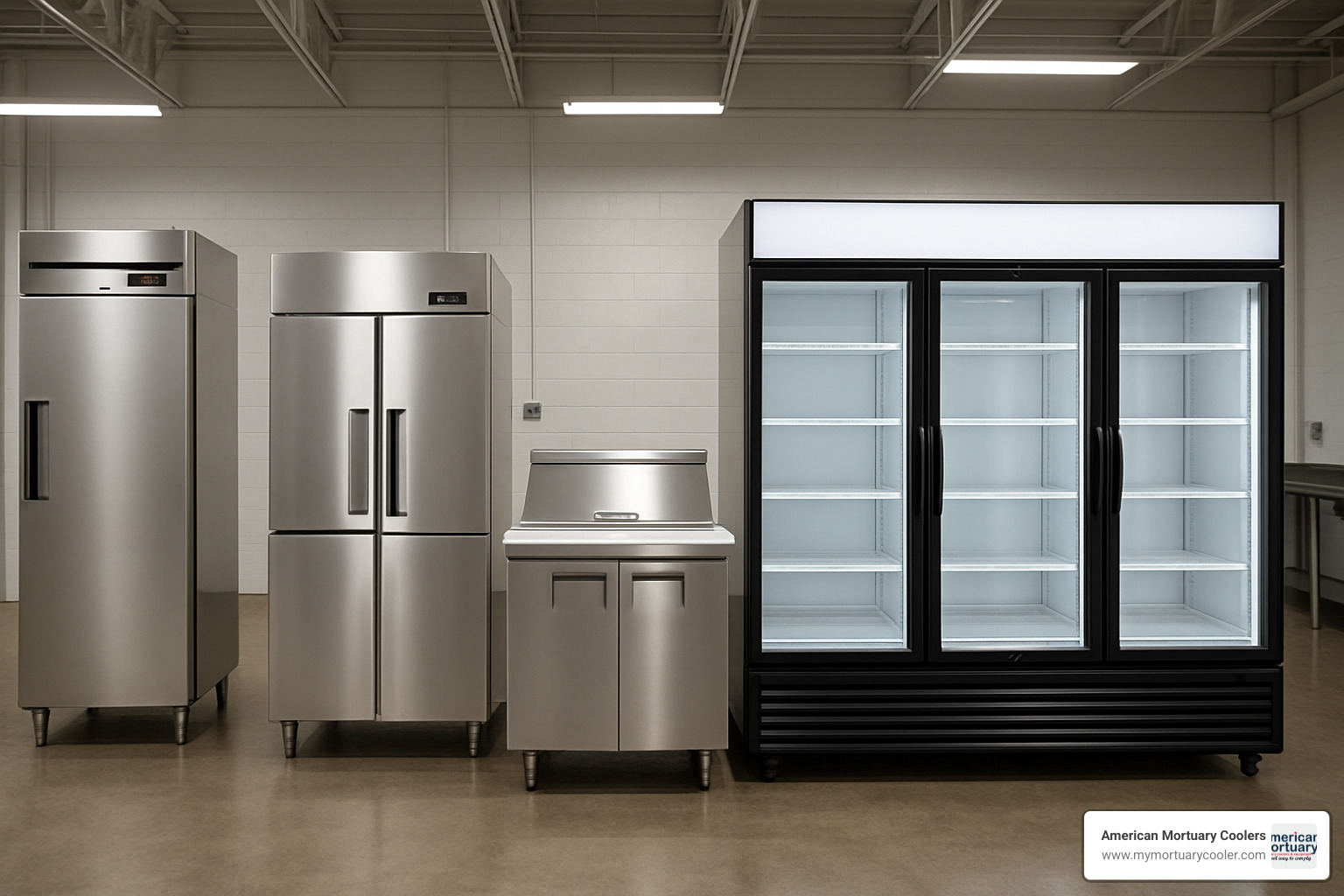
Common Types of Commercial Refrigeration
When I first started helping funeral homes find refrigeration solutions, I quickly realized how overwhelming the options can be. Let me walk you through the main types you'll encounter in the used commercial fridge market.
Those tall, cabinet-style reach-in refrigerators and freezers are the true workhorses of commercial cooling. Available with single, double, or triple doors, they're perfect for bulk storage. Most refrigerators maintain temperatures between 33-38°F, while freezers typically run between -10 to 0°F. One funeral director I worked with in Memphis found that a double-door reach-in was perfect for his facility's needs.
If space is tight, undercounter "low boy" refrigerators might be your best friend. These units slide neatly beneath standard 35-36" countertops, keeping frequently used items within easy reach without sacrificing precious floor space. They're particularly useful in smaller facilities where maximizing every square foot matters.
For operations that need cold storage and prep space in one unit, refrigerated prep tables combine both functions beautifully. While they're commonly associated with sandwich shops and pizzerias, I've seen many mortuaries use them in their care centers for various preparation needs. The top-mounted wells keep materials chilled while you work.
If you're looking to display beverages or other items, back bar refrigerators with glass doors offer excellent visibility while maintaining optimal temperatures. These are less common in funeral homes but popular in restaurants and event spaces.
For those needing to showcase products while keeping them properly chilled, display cases come in vertical, horizontal, and curved glass configurations. Though primarily used in retail settings, some funeral homes use smaller display cases for specific purposes.
Finally, walk-in coolers and freezers provide maximum storage for high-volume operations. As Michael Rodriguez from our Dallas location often says, "Walk-ins aren't just bigger—they're a different approach to refrigeration entirely." They can be modular (assembled on-site) or prefabricated and custom to your specific space requirements.
How to Size Your Used Commercial Fridge Correctly
Choosing the right size for your used commercial fridge isn't just about what fits in your space—it's about what fits your operation.
First, calculate your storage capacity needs by considering your daily inventory levels, how often you receive deliveries, and your peak period demands. For standard reach-in units, I typically recommend looking at the interior cubic footage—a single-door unit usually provides about 20-25 cubic feet of storage.
Your workflow requirements should heavily influence your decision. Think about how many items need refrigeration, your typical volume, and whether you need separate temperature zones for different purposes. A funeral home in Chicago switched from multiple small units to one larger refrigerator and reported significantly improved efficiency.
Don't forget to carefully measure your available floor space, accounting not just for the unit's dimensions but also for door swing clearance (typically 270° for full access) and proper ventilation (most units need 3-12" of clearance). I once visited a facility that purchased a perfect unit but couldn't fully open the doors due to a nearby wall—a costly mistake!
I always advise clients to plan for future growth by selecting a unit with about 15-20% more capacity than currently needed. As Jennifer Wu, our Northeast specialist, often says, "It's better to have slightly more refrigeration space than you think you'll need than to constantly struggle with inadequate storage."
Finally, consider the energy load of larger units. You can estimate monthly costs using this simple formula: Monthly Cost = (((Total Watts × run hours per day)/1000) × 30.42 days) × cost per kWh. For perspective, a standard 8'×10' walk-in cooler typically costs around $132 per month to operate at average U.S. commercial electricity rates.
Popular Brands in the Used Commercial Fridge Market
After inspecting thousands of units over my career, I've developed a good sense of which brands stand the test of time in the used commercial fridge world.
True Manufacturing units are built like tanks. Their T-49, T-23, and TSSU prep tables are legendary for reliability, often serving businesses for 15-20+ years with proper care. I've seen 12-year-old True units that look and perform better than some competitors' 3-year-old models.
For energy efficiency at a more competitive price point, Turbo Air has made impressive strides. Their M3R and TGF series, along with TST prep tables, typically provide 10-15+ years of reliable service. One funeral home in our Southeast region has been running the same Turbo Air units for over a decade without major issues.
When budget is less of a concern and premium quality is the priority, Traulsen stands out. Their G-Series reach-ins and RHT refrigerators are built to commercial kitchen standards and often last 20+ years. They're the Cadillac of commercial refrigeration.
Beverage-Air has carved out a niche with their beverage-specific cooling solutions. Their UCR and MT series, along with BB back bar coolers, typically provide 12-18+ years of service when properly maintained.
For those who prefer American manufacturing and customization options, Continental Refrigeration offers excellent SW and DL series worktop refrigerators that typically last 15-20+ years.
Other quality brands worth considering include Perlick, MicroMatic, Dinex, and Atosa. As Carlos Mendez from our Southwest Region wisely notes, "Brand selection should be influenced by your specific application and parts availability in your region. Some brands have better service networks in certain areas, which can be crucial for long-term maintenance."
At American Mortuary Coolers, we've helped funeral homes across all 48 contiguous states find the perfect used commercial fridge for their specific needs. Whether you're in a major city or a small town, we understand the unique requirements of the funeral industry and can guide you to the refrigeration solution that makes the most sense for your facility.
How to Inspect, Buy, Deliver & Install a Used Commercial Fridge
Finding the perfect used commercial fridge is just the beginning of your journey. What happens next can make or break your experience. Let's walk through the critical steps that turn a promising purchase into a successful investment for your business.
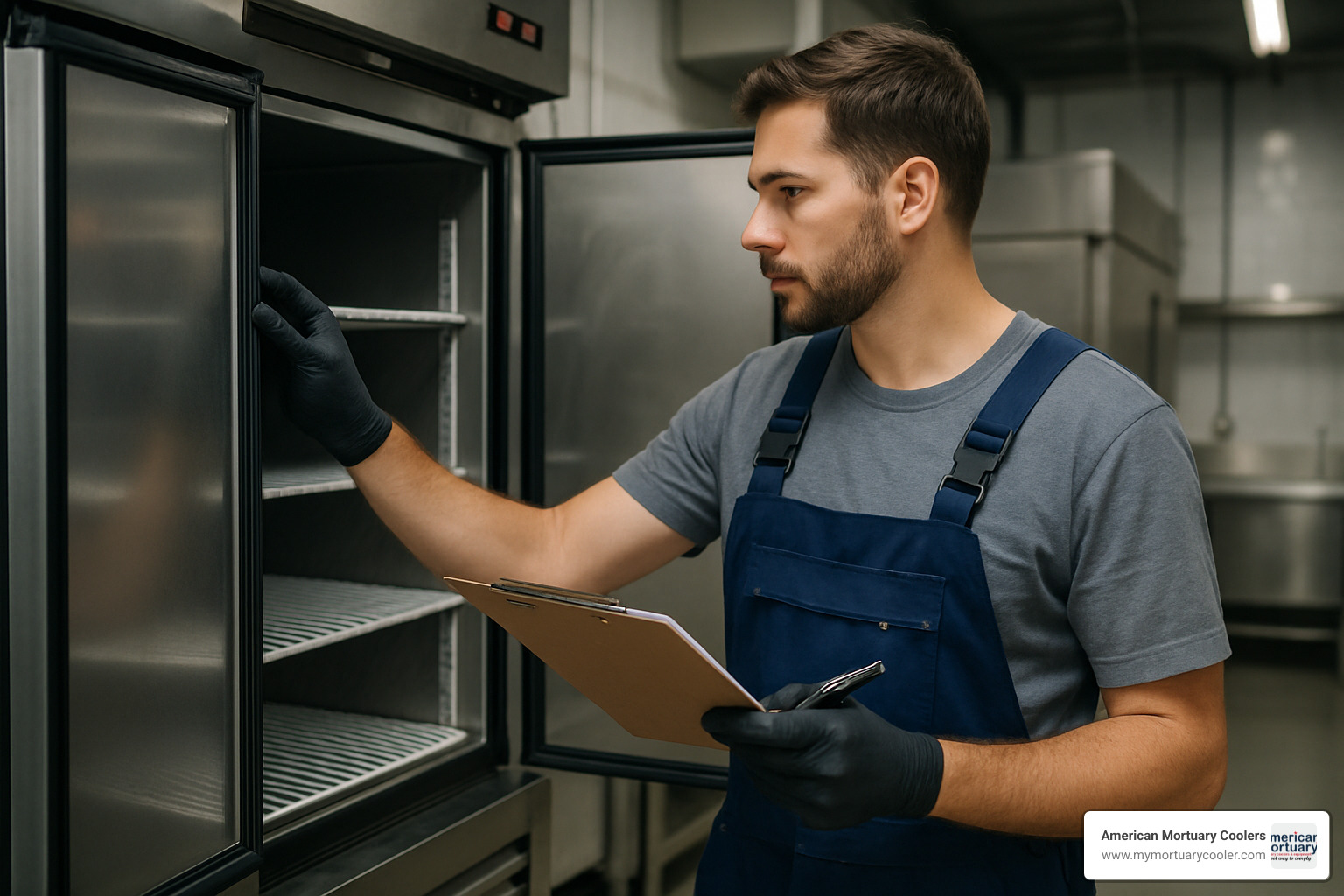
Inspection Checklist Before Purchase
I've seen too many businesses rush through inspections only to face headaches later. At American Mortuary Coolers, we believe thorough inspection saves you time, money, and frustration down the road.
Start with the door gaskets and seals – these are the frontline defenders of your unit's cooling efficiency. Run your hand along the rubber seals feeling for cracks or brittleness. A good test is closing the door on a dollar bill; if you can pull it out easily, the seal isn't tight enough.
Next, check the temperature performance. A properly functioning unit should maintain consistent temperatures throughout the cabinet. Don't just trust the digital display – use a separate thermometer to verify the actual internal temperature matches what's shown. After opening the door for 30 seconds, a good unit should recover to its set temperature within 15 minutes.
When evaluating the compressor, use both your ears and eyes. A healthy compressor hums quietly without grinding or clicking sounds. Look around the compressor for oil stains that might indicate leaks. If possible, ask about the compressor's age – this is the heart of your unit, and replacing it can be costly.
"I once saved a customer from buying a unit with a failing compressor," shares Robert Jackson, our technical director in Chicago. "The seller insisted it was fine, but that slight knocking sound told me it had maybe two months of life left. Trust your senses during inspection."
Don't overlook the evaporator and condenser coils – these should be clean and free from excessive frost buildup. Damaged fins or evidence of leaks are red flags that could indicate bigger problems.
Be thorough when examining the cabinet structure. Look for rust at seams and corners, especially in older units. Ensure shelving is complete and adjustable to meet your specific needs.
Finally, verify the refrigerant system uses current, legal refrigerants like R-134a, R-404A, or R-290. Older units might contain phased-out refrigerants that will complicate future repairs.
For more detailed guidance on evaluating used refrigeration equipment, our buyer's guide to used morgue coolers offers valuable insights that apply to all commercial refrigeration purchases.
The Purchase Process Step-by-Step
Buying a used commercial fridge involves more than just handing over payment. Let's break down the journey from selection to operation.
Begin by requesting a detailed quote that includes exact specifications. Don't settle for vague descriptions – ask for clear photos showing the interior, exterior, and mechanical components. This is also the time to clarify warranty terms and delivery timelines. Darren from our Tennessee office says, "The more questions you ask upfront, the fewer surprises you'll face later."
When it's time to secure payment and documentation, protect yourself by using secure payment methods with buyer protection. Get everything in writing – especially any promised repairs or replacements. A reputable seller will provide a condition report documenting the unit's operational status before shipping.
Delivery coordination is crucial and often overlooked. Measure your doorways and pathways before the unit arrives – I've seen too many businesses find too late that their new fridge won't fit through the door! If your unit is traveling long distances, discuss whether refrigerated transport is necessary to protect sensitive components.
The on-site setup and testing phase is where many problems first surface. Have a dedicated electrical circuit ready with the correct voltage and amperage. If your unit was transported horizontally, allow it to stand upright for at least 24 hours before powering on – this gives the refrigerant and oil time to settle properly. Power on the unit and verify operation before signing the final acceptance form.
During initial operation, give your unit a full day to reach and stabilize at proper temperature before loading product. Use this time to clean thoroughly and arrange shelving for optimal workflow.
"Proper installation isn't just about making the unit work – it's about making it work efficiently," notes Emily Chen, our logistics coordinator in New York. "A properly leveled unit with adequate ventilation can save you hundreds in energy costs over its lifetime."
For professional installation support, many of our customers work with certified refrigeration specialists like OLR Engineering Ltd to ensure their equipment is properly commissioned from day one.
The care you take during these initial stages sets the foundation for years of reliable service from your used commercial fridge. A little extra attention now prevents major headaches later.
Ownership Essentials: Maintenance, Warranties, Financing & Sustainability
Owning a used commercial fridge is like caring for any valuable business asset—it requires attention, care, and smart planning to maximize its value. Let's explore how to keep your investment running smoothly for years to come.
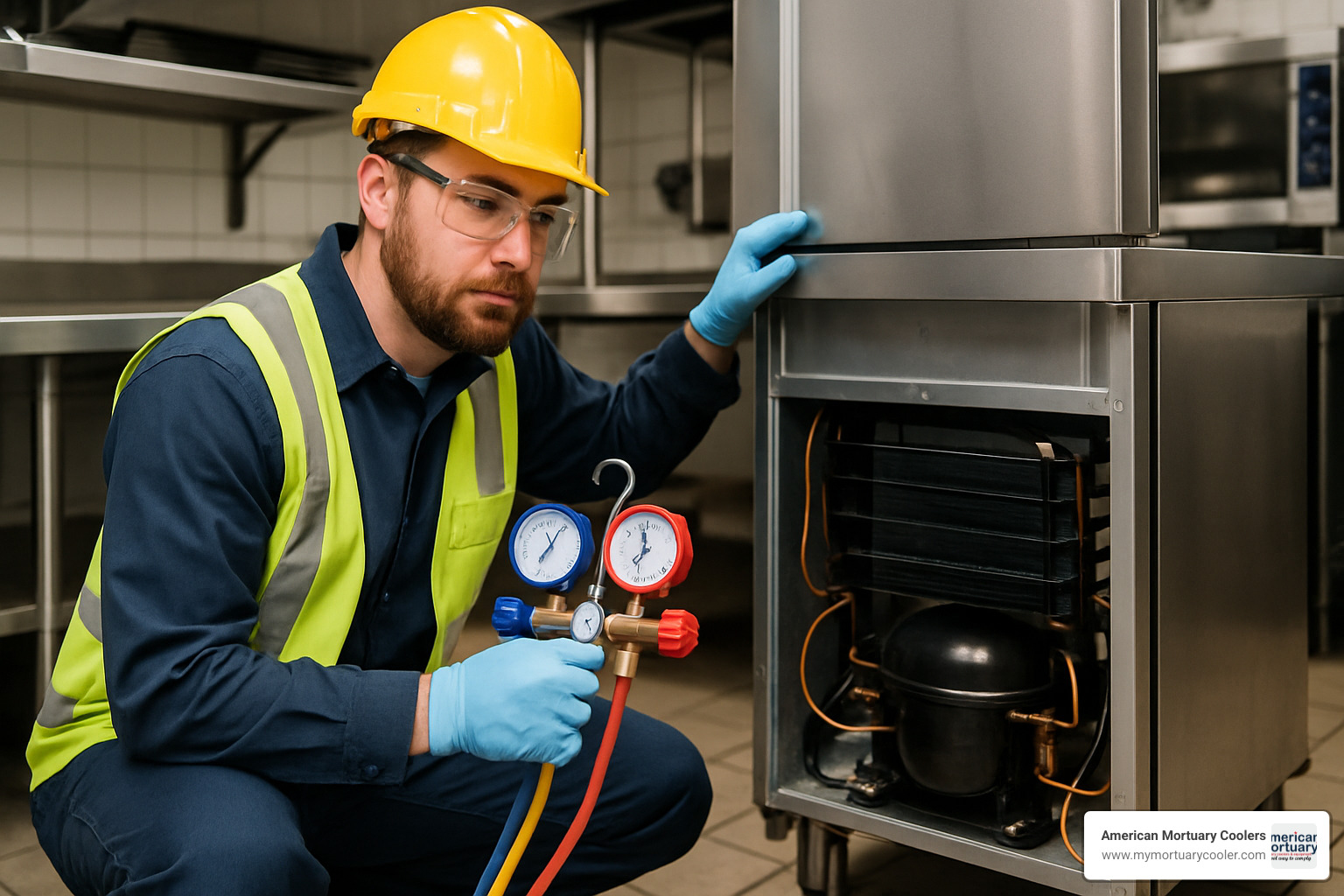
Keeping a "Used Commercial Fridge" Running Efficiently
Remember the old saying that an ounce of prevention is worth a pound of cure? Nowhere is this more true than with commercial refrigeration.
Your daily routine should include wiping down door gaskets with a mild sanitizer—think of these as the front-line defenders keeping cold air in and warm air out. Temperature logs aren't just paperwork; they're your early warning system for potential problems. A quick daily check can catch temperature fluctuations before they become emergencies.
"I had a client who saved thousands by simply cleaning their condenser coils monthly," shares Thomas Wilson, our Midwest Region service manager. "Their unit was drawing too much power trying to cool through dust-clogged coils. After cleaning, their electric bill dropped by nearly $75 a month, and the compressor stopped overheating."
Weekly organization of your fridge's contents isn't just about neatness—it ensures proper air circulation that helps maintain consistent temperatures and reduces energy consumption. Those drain lines that seem insignificant? They're critical pathways that prevent moisture buildup and potential ice formation.
Monthly condenser coil cleaning might be the single most important maintenance task you perform. These coils release heat from your system, and when they're dirty, your compressor works harder, uses more electricity, and wears out faster. A simple brushing and vacuuming can extend your compressor's life by years.
For the technical aspects beyond basic maintenance, developing a relationship with a qualified refrigeration technician pays dividends. Annual professional service checks can identify potential issues before they become costly emergencies. As Sarah from Memphis told us, "The $150 I spend on annual maintenance has saved me from at least two major breakdowns over the past five years."
Warranties & Guarantees on Used Units
The myth that used equipment comes without protection couldn't be further from truth. Most reputable dealers, including us at American Mortuary Coolers, stand behind the equipment we sell.
Our standard warranty includes 30-90 days of parts and labor coverage for mechanical issues, with many units qualifying for our extended 1-year compressor warranty. This means you're protected against major system failures right from the start.
"We completely disassemble, clean, test, and rebuild every certified unit," explains Sarah Johnson, our warranty specialist based in our Pacific Region office. "This thorough process allows us to offer warranties that rival new equipment on select pre-owned units."
For businesses seeking additional peace of mind, extended warranty options provide comprehensive coverage beyond the standard terms. These plans often include priority service response—a crucial benefit when every hour of downtime means lost revenue or compromised inventory.
The key to warranty satisfaction is understanding exactly what's covered. Always request written warranty terms that clearly outline covered components, labor provisions, and exclusion conditions. Keep this documentation with your equipment records for easy reference if service becomes necessary.
Financing or Renting a Used Commercial Fridge
The days of needing to pay cash upfront for commercial equipment are long gone. Today's flexible financing options make acquiring quality refrigeration accessible for businesses of all sizes.
Equipment financing typically offers 2-5 year terms with fixed monthly payments that help with predictable budgeting. With only 10-20% down in most cases, you can preserve capital for other business needs while still securing essential equipment.
"A $4,000 used commercial refrigerator financed over 24 months might cost less than $200 per month," notes Michael Garcia, our finance specialist. "That's often less than a single day's revenue impact if your refrigeration fails, while providing immediate operational benefits and potential tax advantages."
Lease-to-own programs offer even greater flexibility, with monthly payments that build equity toward ownership. These arrangements are particularly beneficial for growing businesses that may need to upgrade equipment as their needs evolve.
For seasonal operations or temporary needs, short-term rentals provide immediate refrigeration solutions without long-term commitment. These programs typically include maintenance services—a significant advantage for businesses focused on their core operations rather than equipment upkeep.
Specialized financing partners like SilverChef have created programs specifically for food service equipment, with unique features like Rent-Try-Buy options that let you test equipment before committing to long-term ownership.
Green Perks: Sustainability Wins
Choosing a used commercial fridge isn't just good for your bottom line—it's a win for the planet too.
"The greenest product is the one that already exists," reminds Dr. Elizabeth Chen, environmental consultant for American Mortuary Coolers. "Extending the useful life of well-built refrigeration through refurbishment often represents the most environmentally responsible choice a business can make."
When you purchase pre-owned refrigeration, you're directly contributing to resource conservation by reducing demand for new manufacturing materials and energy. Consider that producing a single commercial refrigerator requires hundreds of pounds of steel, copper, aluminum, and plastic—all of which require significant energy to extract, process, and fabricate.
The waste reduction impact is equally significant. Commercial refrigerators are large, complex appliances that present disposal challenges. By keeping these units in service, you're preventing them from entering landfills prematurely while also reducing the packaging waste associated with new equipment purchases.
Proper refrigerant management during the refurbishment process ensures that potentially harmful substances are handled correctly, preventing atmospheric release and environmental damage. Many older units can be retrofitted with newer, more eco-friendly refrigerants during the refurbishment process.
Energy efficiency improvements are often part of the refurbishment process. Digital thermostats, improved fan controls, and LED lighting retrofits can significantly reduce the operating costs of older equipment while extending its useful life.
For businesses with sustainability goals or ESG (Environmental, Social, and Governance) reporting requirements, documenting the resource conservation associated with purchasing used equipment can contribute meaningful metrics to sustainability reports.
For more resources on maintaining your equipment affordably, check out our guide on finding affordable mortuary supplies, which includes products suitable for all commercial refrigeration maintenance needs.
Frequently Asked Questions about Used Commercial Fridges
You've got questions about used commercial fridges? We've got answers! After helping businesses from New York to Los Angeles find reliable refrigeration solutions, our team at American Mortuary Coolers has heard it all. Here's what customers most often want to know before making their purchase.
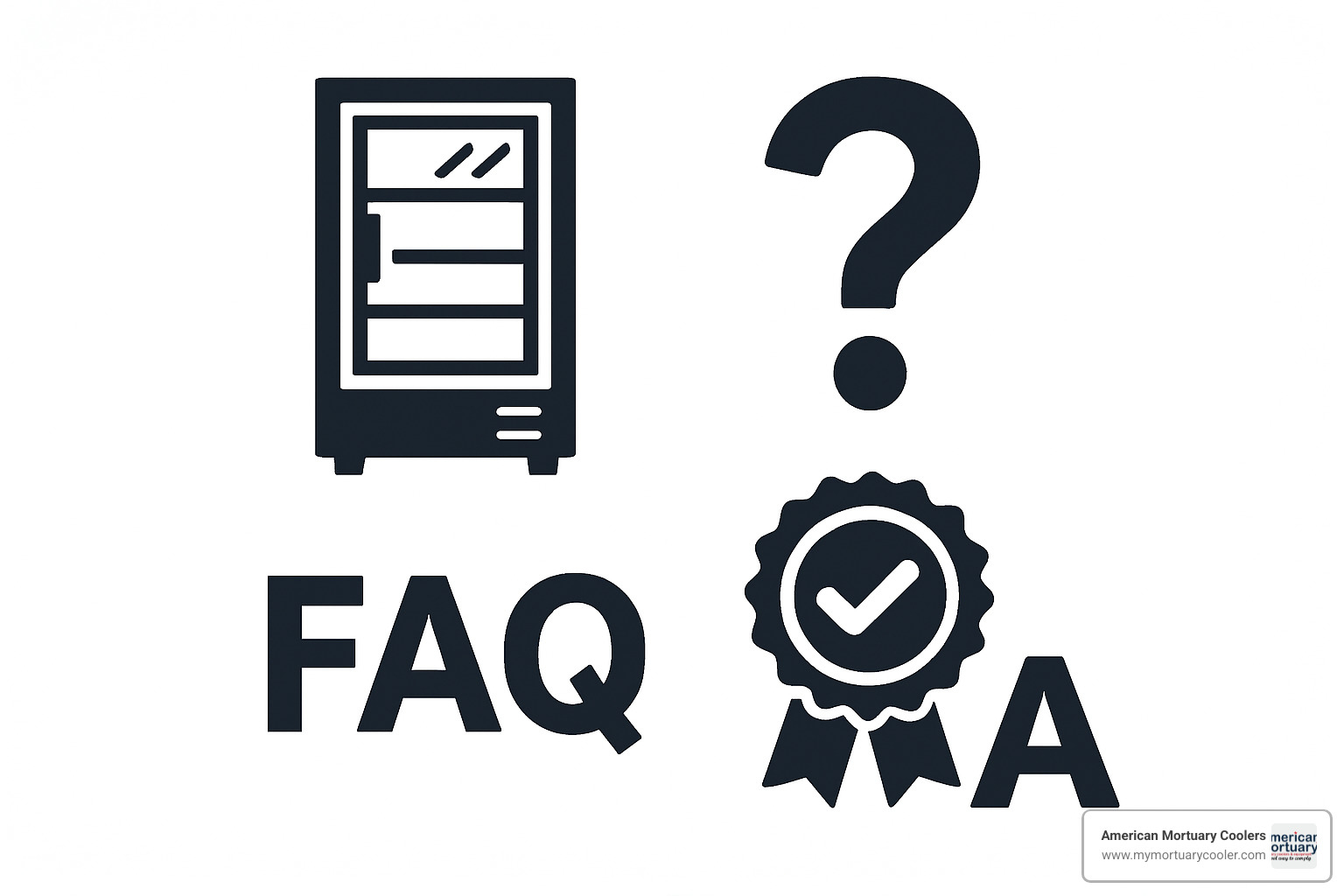
What Certifications Should a Used Commercial Fridge Meet?
When shopping for a used commercial fridge, certifications matter – they're not just fancy stickers. Most importantly, look for NSF certification (National Sanitation Foundation), which ensures the equipment meets strict food safety standards. This certification verifies that materials are food-safe, surfaces are easily cleanable, and the unit can maintain proper storage temperatures.
Equally important is UL certification (Underwriters Laboratories), which addresses electrical safety. This isn't just a nice-to-have – many insurance providers and local codes require it. It confirms your unit is properly grounded and won't become a fire hazard.
"I can't stress enough how important proper certification is," says Jennifer Martinez, our compliance specialist. "I've seen businesses forced to replace perfectly functional equipment because it didn't meet local health department requirements. That's an expensive lesson."
If energy efficiency is a priority, check for Energy Star ratings. Even if the certification has technically expired on an older model, the design efficiency remains. Better yet, some utility companies offer rebates even on used Energy Star equipment – it's worth asking about!
Local health departments often have their own specific requirements that vary by jurisdiction and application. What's acceptable for a flower shop cooler might not work for food service. Our Tennessee team regularly helps customers steer these requirements across all our service regions.
How Long Will a Used Commercial Fridge Last?
One of the most common questions we hear is about lifespan, and I love giving this answer: commercial refrigeration is built differently than your home fridge. With proper care, a quality used commercial fridge can serve your business for many years.
The brand matters significantly. Premium brands like True, Traulsen, and Continental are engineered for 15-20+ years of total service life. Mid-range brands typically offer 10-15 years, while economy brands generally provide 7-10 years of use.
Age and previous usage naturally factor in. A lightly used 3-year-old unit might have 10-15 years of life ahead, while a heavily used 12-year-old fridge might offer another 3-7 years of reliable service.
"The maintenance history is the real crystal ball," explains Robert Chen, our technical director. "A well-maintained unit can last 30-50% longer than one that's been neglected. When a customer shows me service records with regular coil cleaning and preventative maintenance, I know that unit has a bright future ahead."
What truly sets commercial units apart is their repairability. Unlike residential refrigerators that often become disposable appliances, commercial units are designed for component replacement. A new compressor adds 7-10 years of life. Upgrading evaporator or condenser coils gives you another 5-7 years. Even modernizing control boards can extend life by 3-5 years.
As Robert likes to say, "With proper care and timely repairs, a quality commercial refrigerator is like the Ship of Theseus – it can theoretically last indefinitely as parts are replaced, as long as the cabinet stays structurally sound."
Are There Risks to Buying Used and How Do I Avoid Them?
Let's be honest – buying any used equipment comes with some risk. But with used commercial fridges, these risks are manageable when you take the right precautions.
The most significant concern is hidden mechanical issues. That weird noise the seller didn't mention? It could be an expensive repair waiting to happen. This is why it's crucial to purchase only from reputable dealers with technical expertise. At American Mortuary Coolers, we run every unit for at least 48 hours before considering it for our inventory.
"The dealer you choose makes all the difference," emphasizes David Thompson, our Rocky Mountain Region director. "A good dealer isn't just selling you equipment – they're lending you their technical expertise and reputation."
Warranty coverage is another consideration. Most used equipment comes with limited warranty periods – typically 30-90 days for parts and labor, with perhaps a year on the compressor. Understand exactly what's covered, and consider budgeting for potential out-of-warranty repairs. Building a relationship with local service providers before you need emergency service is always wise.
Energy efficiency can vary dramatically in older equipment. Request actual amperage readings and compare energy usage to current models. Sometimes, simple component upgrades like digital temperature controls or ECM fans can significantly improve efficiency in older units.
Finally, parts availability becomes increasingly important as equipment ages. Stick with major brands that have robust parts networks, especially for units over 10 years old. We specifically select models for our inventory that have excellent parts availability and documented service histories.
The beauty of working with a specialist like American Mortuary Coolers is that we've already considered these risks before offering any unit for sale. We've done the detective work, run the tests, and can provide the guidance to help you make a confident purchase decision – whether you're in Tennessee or any of the 48 contiguous states we serve.
Conclusion
Investing in a used commercial fridge represents a strategic decision that balances financial prudence with operational necessity. Throughout this guide, we've explored the substantial benefits of choosing pre-owned refrigeration equipment, from the significant cost savings of 30-60% compared to new units, to the environmental advantages of extending the useful life of well-built commercial equipment.
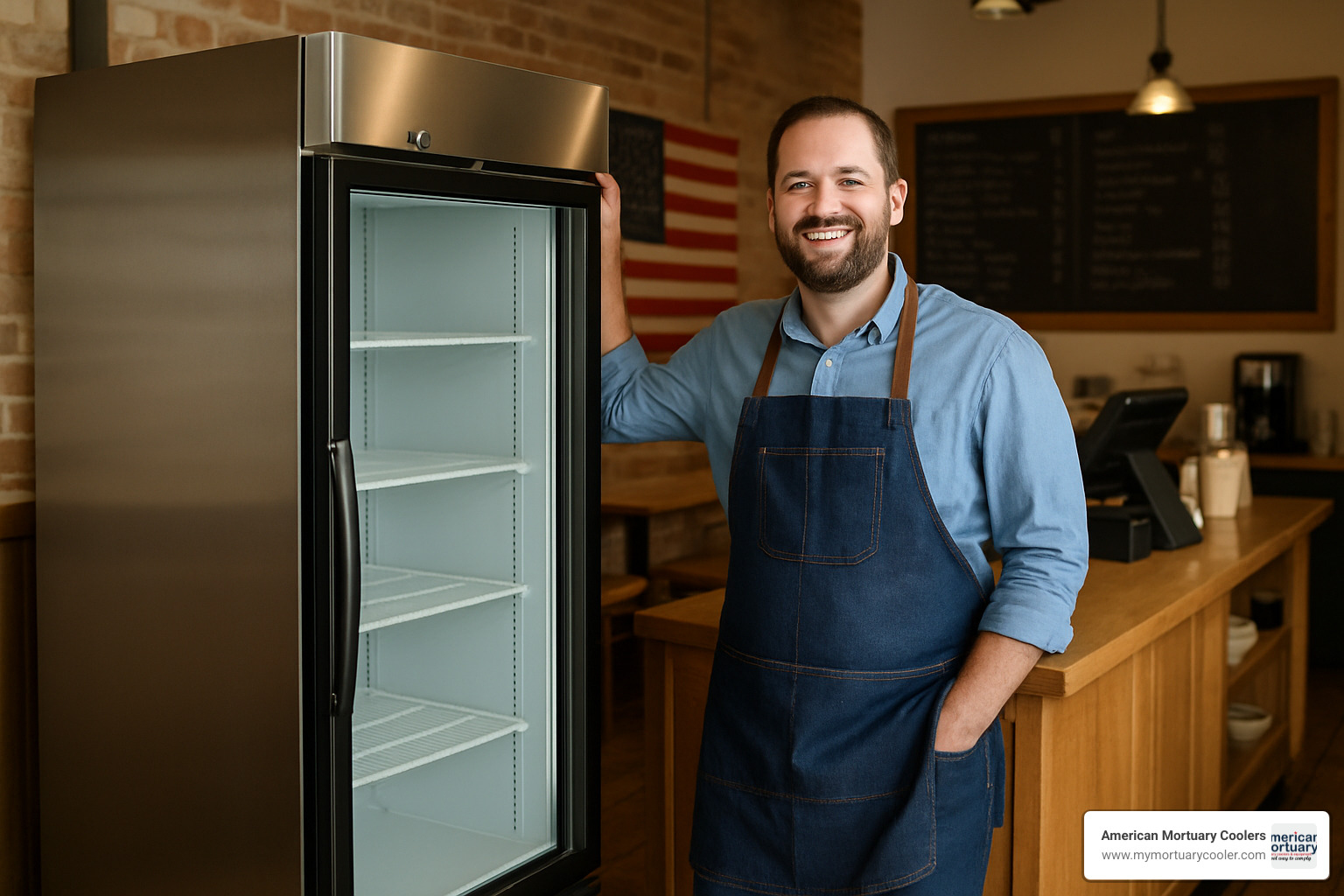
The market for used commercial refrigeration is wonderfully diverse. From compact undercounter units that tuck neatly beneath prep stations to spacious walk-ins that can store an entire inventory, businesses of every size and type can find something that fits their needs perfectly. It's reassuring to know that trusted brands like True, Turbo Air, and Traulsen maintain their reliability well into their second life, especially when they've been properly cared for.
"I was skeptical about buying used at first," shares Maria Rodriguez, a bakery owner from Nashville. "But our six-year-old True reach-in has been more reliable than some brand-new equipment we've purchased. The savings allowed us to invest in other areas of our business when we needed it most."
If you're considering a used commercial fridge purchase, remember these five essential points:
Know your needs before shopping. Take time to assess your specific refrigeration requirements, including capacity, features, and space constraints. This preparation prevents the common pitfall of buying either too much or too little refrigeration.
Inspect thoroughly using our comprehensive checklist. Those door gaskets, compressor sounds, and temperature consistency tests aren't just suggestions—they're your protection against costly surprises down the road.
Maintain diligently once you've made your purchase. A simple monthly condenser cleaning can add years to your unit's life and dollars to your bottom line through improved efficiency.
Consider total cost, not just the purchase price. Factor in energy efficiency, warranty coverage, and financing options to understand the true value proposition of each potential purchase.
Buy from experts who stand behind their inventory. At American Mortuary Coolers, we've built our reputation on providing reliable, thoroughly inspected used refrigeration equipment to businesses across our service regions, from Atlanta to Chicago, Dallas to New York.
While our specialty is mortuary refrigeration, our expertise extends to all commercial refrigeration applications. We understand that whether you're storing food or providing essential mortuary services, reliability isn't optional—it's absolutely critical.
"The perfect refrigeration solution balances initial cost with long-term reliability," explains James Wilson, our founder. "A quality used unit, properly selected and maintained, often represents the optimal choice for businesses at any stage."
For businesses just starting out, the savings from choosing used equipment can make the difference between launching now or delaying your dreams. For established operations, pre-owned units offer an opportunity to expand capacity without expanding your budget proportionally.
For more information about our full range of new and used refrigeration solutions, visit our comprehensive guide to American Mortuary Coolers' product range.
Whether you're outfitting a new business, expanding existing operations, or replacing aging equipment, a used commercial fridge offers the perfect blend of performance and value. With proper selection and care, these units will reliably serve your business for many years to come—keeping your products cold and your budget intact.



















